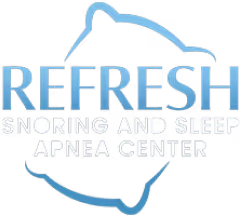What Your Sleep Tracker Isn’t Telling You About Sleep Apnea
Sleep trackers and smartwatches are incredibly popular tools for monitoring sleep. They offer data on bedtime, movement, and even estimated sleep stages - information that can help us begin thinking more critically about our rest. But when it comes to detecting sleep apnea symptoms, these devices have significant blind spots.
If you’ve been relying solely on a wearable to assess your sleep health, it’s possible you’re missing the real issue. At Refresh Snoring and Sleep Apnea Center in Denver, we often meet patients whose trackers say they're getting a full night’s rest - yet they still wake up exhausted. In many of these cases, undiagnosed sleep apnea is the reason.
Quick Summary: What Your Tracker Might Be Missing
- Sleep apnea isn’t about sleep duration - it’s about sleep quality, oxygen, and airflow.
- Trackers don’t measure breathing disruptions, which are central to sleep apnea.
If you're wondering “why am I yawning so much?”, it could be more than just stress or late nights. - A proper sleep study remains the most reliable way to detect and manage sleep apnea.
Explore our full sleep health solutions here →
What Sleep Trackers Can and Can’t Do
The Basics of Sleep Tracking
Most sleep trackers use sensors to monitor:
- Movement (actigraphy)
- Heart rate variability
- Estimated breathing rate
- Sleep/wake cycles based on patterns
They’re useful for identifying inconsistent sleep habits, late bedtimes, or low total sleep time. If you're just beginning to evaluate your rest, these tools offer a helpful starting point.
Learn more in our blog on smartwatches and sleep apnea.
Where Trackers Fall Short
Even the most advanced wearables cannot:
- Detect breathing interruptions or oxygen desaturations
- Recognize apnea events during REM sleep
- Account for micro-arousals, which fragment your sleep without waking you fully
- Distinguish snoring, gasping, or choking sounds during sleep
Sleep apnea is defined by repeated airway obstructions, and these are physiological changes - not just movement - that most trackers are not equipped to detect.
Signs You Might Be Missing More Than Sleep
Daytime Red Flags
If you're asking, “Why am I yawning so much, even after sleeping?” consider the following symptoms:
- Persistent fatigue or grogginess
- Difficulty concentrating (brain fog)
- Mood changes or irritability
Morning headaches
These are classic signs of untreated sleep apnea, even if your tracker reports eight hours in bed.
Nighttime Clues Trackers Can’t Measure
Your sleep data may look fine, but if your bed partner has noticed:
- Loud, frequent snoring
- Pauses in breathing
- Choking or gasping sounds
- Tossing and turning throughout the night
…those are strong indicators that your sleep is not as restorative as it should be.
Why Medical Sleep Testing Still Matters
Clinical Testing vs. Consumer Tech
Consumer devices serve a purpose - but they aren’t diagnostic tools. They lack the ability to track:
- Oxygen saturation
- Respiratory effort
- Airflow and nasal pressure
- EEG (brain wave activity) to measure true sleep stages
Home sleep tests offer a more detailed view than wearables, but they have limitations too. One of the key disadvantages of home sleep testing is that it can miss:
- Mild sleep apnea
- REM-specific apnea
- Apnea that only occurs while sleeping on your back
This is why professional sleep studies in Denver remain the most accurate and comprehensive option.
See how we help uncover real sleep results →
What to Expect from a Sleep Study
A general sleep study - also known as a polysomnogram - is a non-invasive, overnight test that records detailed information about how your body functions during sleep. These studies typically monitor:
- Breathing patterns and airflow interruptions
- Oxygen levels throughout the night
- Heart rate and rhythm
- Brain activity to identify sleep stages and disruptions
- Muscle movements and limb activity
- Snoring and audio events, such as gasping or choking
Sleep studies can be conducted in a sleep lab or, in some cases, at home using simplified equipment. The goal is to provide a comprehensive picture of your sleep quality, identify conditions like sleep apnea, and guide appropriate treatment - offering answers that a wearable device cannot.
Frequently Asked Questions
Q: What are common sleep apnea symptoms?
A: Snoring, gasping for air during sleep, daytime fatigue, headaches, mood changes, and frequent nighttime awakenings.
Q: Can a smartwatch detect sleep apnea?
A: No. While it may show irregular patterns, it cannot measure oxygen levels or confirm apnea events.
Q: Why am I yawning so much even after sleeping?
A: Frequent yawning may indicate poor sleep quality or undiagnosed sleep apnea, even if your sleep tracker says otherwise.
Q: Are home sleep tests accurate?
A: They're helpful, but they may miss certain types of apnea. Full studies remain the most reliable method for diagnosis.
Q: Where can I get a sleep study in Denver?
A: Refresh Snoring and Sleep Apnea Center can assist you in finding comprehensive sleep testing in Denver, with expert-led evaluations and clear follow-up support.
Don’t Let Your Sleep Tracker Be the Final Word
Smart devices are helpful—but they’re not a substitute for clinical evaluation when it comes to sleep apnea symptoms. If you’re still tired despite "good numbers," it’s time to look deeper. Refresh Snoring and Sleep Apnea Center is here to help you get real answers, not just more data.
Schedule a personalized consultation or learn more about accurate testing options here

.svg)




